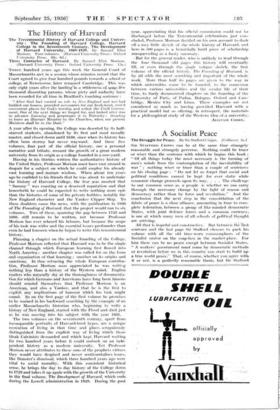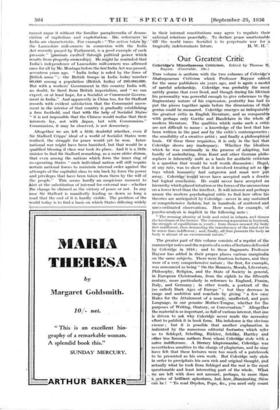A Socialist Peace
The Struggle for Peace. _SySir Stafford Cripps, (Gollalicz. 5s.) SIR STAFFORD CRIPPS can be at the same time strangely reasonable and strangely -perverse. Nothing -could be truer or wiser than the sentence with which he begins, this book " Of all things today the most necessary is the turning of men's minds from the contemplation of the inevitability of war " ; nothing wiser or truer than a couple of sentences on his closing page : " Do not let us forget that social and political conditions cannot be kept for ever static while economic change proceeds upon its way. . . . The challenge to our common sense as a people is whether we can carry through the necessary change by the light of reason and democracy rather than by force and revolution." And the conclusion that the . next step in the consolidation of the fabric of peace is a elosenlliance, amounting in time to corn- plete federation, between a group of like-minded democratic States, with joint defence forces and a common currency, is one at which .many men of all schools of political 'thought are arriving. All that is hopeful and constructive. But between the-16A sentence and the last page Sir Stafford chooses to pack his volume with all the old time-worn commonplaces of the Socialist orator on the soap-box the market-place. For him there can be no peace except between Socialist States. " A worker government must came by democratic methods or revolution before we in this country can start to build pp a true .world .peaCe?' That, of course, whether you agree with it or riot, is a perfectly reasonable thesis, but Sir Stafford cannot argue it without the familiar paraphernalia of denun- ciation of Capitalism - and --exploitation.— His -references"'-to' India are characteristic. For example : "The action taken "lly-) the Lancashire mill-owners in connexion with the India Act recently passed by parliament, is a good example of such pressure " [pressure exerted titian& political poWei which results from property niviiershipl. He might be reminded that India's independence of Lancashire mill-owners was affirmed once for all by Mr: Montagu before the last India Act was passed, seventeen years ago. " India today is ruled by the force of British arms " ;—the British• troops tin India - today!number-, 1'40,000 among a population (British India) of 290,000,000. But with a workers' Government in this country India will, no doubt, be freed from British imperialisin; and " we can expect, or at least hope, for a.Soeialist or Conimnnist GOvern- Ment in India." And apparently in China too, for Sir Stafford *cords with evident satisfaction that the Communist move- ment in the interior of that country is gradually establishing a firm foothold; -and that with the help of Socialist Slates " it is not impossible that the Chinese would realise that.their interests lay, not with Japan, but with Communism." Communism, it may be observed, is not democracy.
Altogether we are left a little doubtful whether, • even if Sir Stafford Cripps' ideal of a world of Socialist States were realised, the struggle for peace would yet be won. Inter- national war might have been banished, but that would be a qualified blessing if class war took its place. And it is a little sinister to find Sir Stafford remarking, as a mere outer dictum, that even among the nations which form the inner ring -of co-operating States " each individual nation will still require certain national forces to maintain internal order against the attempts of the capitalist class to win back by force the power and privileges that have been taken from them by the will of the people." This seems hardly an auspicious moment to .dint at the substitution of internal for external war—whether the change be claimed as the victory of peace or not. In any aase Sir Stafford is manifestly leading us down so long a road that the end of it is hardly visible: The problem of the 'world today is to find a basis on which States differing widely in their internal constitutions may agree to regulate their - 4.*Thal_relations peacefully. _To declare .peace unattainable,
• tall the world turns Socialist is to perpetuate war for a



















































 Previous page
Previous page